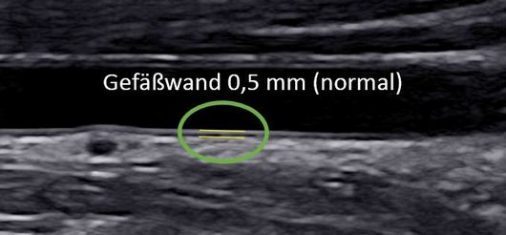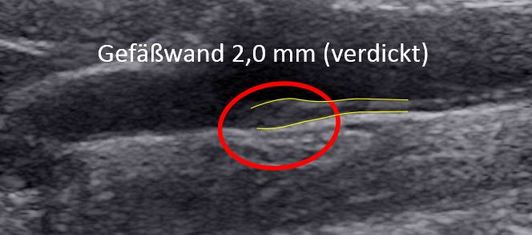In the interest of preventive care, I often examine the vessels of younger individuals in my praxis, who are not actually patients but are simply coming in for a routine check-up. The result is often unexpected, as I frequently find vascular changes such as wall thickening (which are precursors to plaques or calcifications) even in 40-year-olds. But is it really that surprising?
In recent years, medicine has increasingly focused on prevention, and the ultrasound devices needed for painless vascular examinations have become much more accurate. Today, we can look into the vessel wall down to 1/10 of a millimeter.
There is now sufficient data proving that vascular wall changes, which ultimately lead to heart attack or stroke, develop gradually and predictably over decades—it is no coincidence who ends up suffering from such a condition at the age of 70. According to Statistics Austria, approximately 43% of Austrians in 2016 died from a cardiovascular cause (primarily heart attack and stroke). That’s nearly one in two, so this concerns all of us!
Early changes in the blood vessels can often be observed 30 years or even earlier before cardiovascular events occur. Some experts speak of the first changes in youth. What is to blame for these vascular changes? Risk factors such as smoking, high blood pressure (stress!), high cholesterol levels (especially the “bad” LDL cholesterol), undiagnosed (and untreated) diabetes, as well as genetic factors (families in which parents have had a heart attack or stroke at an early age), contribute to this. What to do?
One should also keep in mind as a young person that they can be affected and should undergo a medical check-up in a timely manner. Risk factors like high cholesterol can already be present in adolescents. High blood pressure often comes with a stressful professional life or, in women, frequently accompanies menopause. Life has become very fast, too fast. Some compensate for it with nicotine or alcohol. Important family obligations prevent regular physical activity in leisure time. Nutrition also plays a significant role. You should not ignore risk factors. Get your blood vessels checked, better late than never. If there are vascular changes, you should analyze your risk factors with your doctor. Timely lifestyle changes, but if necessary, treatment with medication, can stabilize the changes in your vessels and prevent serious subsequent illnesses!




